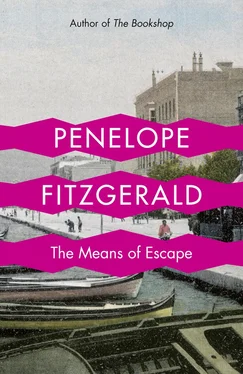‘Does your room face the sea?’
‘No, I don’t care to look at the sea. My window looks on to the Derwent, up the river valley to the north-west.’
Now that she was looking at him he put his two thumbs and forefingers together in a sign which she had understood and indeed used herself ever since she was a child. It meant I give you my whole heart.
‘I should have thought you might have wanted to know what I was going to do when I reached England,’ he said.
‘I do know. You’ll be found out, taken up and committed to Pentonville as an escaped felon.’
‘Only give me time, Miss Alice, and I will send for you.’
In defiance of any misfortune that might come to him, he would send her the needful money for her fare and his address, once he had a home for her, in England.
‘Wait and trust, give me time, and I will send for you.’
In low-built, shipshape Battery Point the Rectory was unusual in being three storeys high, but it had been smartly designed with ironwork Trafalgar balconies, and the garden had been planted with English roses as well as daisy bushes and silver wattle. It was the Rector’s kind-heartedness which had made it take on the appearance of a human warren. Alice’s small room, as she had told Savage, looked out on to the river. Next to her, on that side of the house, was the visiting preacher’s room, always called, as in the story of Elijah, the prophet’s chamber. The Lukes faced the sea, and the Rector had retreated to what had once been his study. Mrs Watson slept at the back, over the wash-house, which projected from the kitchen. Above were the box-rooms, all inhabited by a changing population of no-hopers, thrown out of work by the depression of the 1840s. These people did not eat at the Rectory – they went to the Colonial Families’ Charitable on Knopwood Street – but their washing and their poultry had given the grass plot the air of a seedy encampment, ready to surrender at the first emergency.
Alice did not undress the following night, but lay down in her white blouse and waist. One of her four shawls and one of her three skirts lay folded over the back of the sewing chair. At first she lay there and smiled, then almost laughed out loud at the notion of Savage, like a mummer in a Christmas pantomime, struggling down the Battery steps and on to the wharves under the starlight in her nankeen petticoat. Then she ceased smiling, partly because she felt the unkindness of it, partly because of her perplexity as to why he needed to make this very last part of his run in skirts. Did he have in mind to set sail as a woman?
She let her thoughts run free. She knew perfectly well that Savage, after years of enforced solitude, during which he had been afforded no prospect of a woman’s love, was unlikely to be coming to her room just for a bundle of clothes. If he wanted to get into bed with her, what then, ought she to raise the house? She imagined calling out (though not until he was gone), and her door opening, and the bare shanks of the rescuers jostling in in their nightshirts – the visiting preacher, Mr Luke, her father, the upstairs lodgers – and she prayed for grace. She thought of the forgiven – Rahab, the harlot of Jericho, the wife of Hosea who had been a prostitute, Mary Magdalene, Mrs Watson who had cohabited with a drunken man.
You may call me Miss Alice.
I will send for you.
You could not hear St George’s clock from the Rectory. She marked the hours from the clock at Government House on the waterfront. It had been built by convict labour and intended first of all as the Customs House. It was now three o’clock. The Constancy sailed at first light.
Give me time and I will send for you.
If he had been seen leaving the church, and arrested, they would surely have come to tell the Rector. If he had missed the way to the Rectory and been caught wandering in the streets, then no one else was to blame but herself. I should have brought him straight home with me. He should have obtained mercy. I should have called out aloud to every one of them – look at him, this is the man who will send for me.
The first time she heard a tap at the window she lay still, thinking, ‘He may look for me if he chooses.’ It was nothing, there was no one there. The second and third times, at which she got up and crossed the cold floor, were also nothing.
Alice, however, did receive a letter from Savage (he still gave himself that name). It arrived about eight months later, and had been despatched from Portsmouth. By that time she was exceedingly busy, since Mrs Watson had left the Rectory, and had not been replaced.
Honoured Miss Alice,
I think it only proper to do Justice to Myself, by telling you the Circumstances which took place on the 12 of November Last Year. In the First Place, I shall not forget your Kindness. Even when I go down to the Dust, as we all shall do so, a Spark will proclaim, that Miss Alice Godley Relieved me in my Distress.
Having got to the Presbittery in accordance with your Directions, I made sure first of your Room, facing North West, and got up the House the handiest way, by scaleing the Wash-house Roof, intending to make the Circuit of the House by means of the Ballcony and its varse Quantity of creepers. But I was made to Pause at once by a Window opening and an Ivory Form leaning out, and a Woman’s Voice suggesting a natural Proceeding between us, which there is no need to particularise. When we had done our business, she said further, You may call me Mrs Watson, tho it is not my Name. – I said to her, I am come here in search of Women’s Clothing. I am a convict on the bolt, and it is my intention to conceal myself on Constancy, laying at Franklyn Wharf. She replied immediately, ‘I can Furnish you, and indeed I can see No Reason, why I should not Accompany you.’
This letter of Savage’s in its complete form, is now, like so many memorials of convict days, in the National Library of Tasmania, in Hobart. There is no word in it to Alice Godley from Mrs Watson herself. It would seem that like many people who became literate later in life she read a great deal – the Bible in particular – but never took much to writing, and tended to mistrust it. In consequence her motives for doing what she did – which, taking into account her intense affection for Alice, must have been complex enough – were never set down, and can only be guessed at.
You will recall that when the planned redundancies became necessary as the result of the discouraging trading figures shown by this small firm – in contrast, so I gather from the Company reports, with several of your other enterprises – you personally deputed to me the task of ‘speaking’ to those who were to be asked to leave. It was suggested to me that if they were asked to resign in order to avoid the unpleasantness of being given their cards, it might be unnecessary for the firm to offer any compensation. Having glanced personally through my staff sheets, you underlined the names of four people, the first being that of my clerical assistant, W. S. Singlebury. Your actual words to me were that he seemed fairly old and could probably be frightened into taking a powder. You were speaking to me in your ‘democratic’ style.
From this point on I feel able to write more freely, it being well understood, at office-managerial level, that you do not read more than the first two sentences of any given report. You believe that anything which cannot be put into two sentences is not worth attending to, a piece of wisdom which you usually attribute to the late Lord Beaverbrook.
As I question whether you have ever seen Singlebury, with whom this report is mainly concerned, it may be helpful to describe him. He worked for the Company for many more years than myself, and his attendance record was excellent. On Mondays, Wednesdays and Fridays, he wore a blue suit and a green knitted garment with a front zip. On Tuesdays and Thursdays he wore a pair of grey trousers of man-made material which he called ‘my flannels’, and a fawn cardigan. The cardigan was omitted in summer. He had, however, one distinguishing feature, very light blue eyes, with a defensive expression, as though apologizing for something which he felt guilty about, but could not put right. The fact is that he was getting old. Getting old is, of course, a crime of which we grow more guilty every day.
Читать дальше












